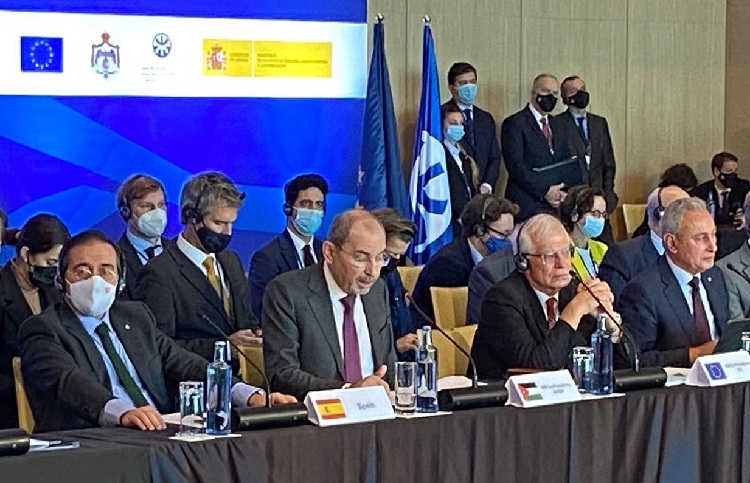The Diplomat
The Minister of Foreign Affairs, José Manuel Albares, appealed yesterday to “dialogue and cooperation” to solve “conflicts and political tensions” in the Mediterranean region, during the opening ceremony of the sixth Regional Forum of the Union for the Mediterranean (UfM), which was not attended, precisely, by the ministers of two of the countries most in need of such “dialogue”, Morocco and Algeria.
“The UfM can create, through dialogue and cooperation, an atmosphere that facilitates the solution, in the appropriate fora and on the basis of agreed parameters, of the conflicts and political tensions that are unfortunately still active in our region,” said Albares during his opening speech at the Forum, held in Barcelona and attended by twenty Foreign Affairs ministers from the 42 countries that make up the UfM – the 27 EU member states and the 15 on the southern shores of the Mediterranean.
To the “old unresolved conflicts” are “added new ones,” which generates a situation that “challenges us” and to which “we cannot remain indifferent,” warned the minister. “The Mediterranean cannot be a barrier that divides us, but a meeting point, a space of stability and shared prosperity,” he added.
Albares pronounced these words before a Forum in which the Foreign Affairs ministers of some of the countries most in need of “dialogue and cooperation” to solve their “political tensions” were absent. This is the case of the head of Moroccan diplomacy, Nasser Bourita, who excused his attendance by means of a telephone call to Albares, and of his Algerian counterpart, Ramtane Lamamra, who also informed the Spanish minister of his absence.
These two absences frustrated the few hopes that the Spanish authorities had of taking advantage of the Forum to lower the tension between the two giants of the Maghreb, whose diplomatic rift affects Spain very directly in such diverse and crucial areas as the stability of the borders and the Western Sahara, the regulation of migratory flows, the fight against terrorism and, in a very special way, the energy supply.
However, his absence at the UfM Forum (and at the subsequent EU-Southern Neighbourhood ministerial meeting, also held yesterday in Barcelona) did not prevent Bourita and Lamamra from coinciding yesterday in Dakar at the China-African Union Cooperation Forum, in which President Xi Jinping participated by videoconference. In fact, the Egyptian Foreign Minister, Sameh Shoukry (with whom Albares held a bilateral meeting yesterday to address “the excellent bilateral relationship between Spain and Egypt, the role of our two countries in the Mediterranean and the importance of the UfM”), was the only African minister in attendance in the Catalan capital. Morocco was represented by a director general, Algeria and Tunisia by their ambassadors in Spain and Mauritania, respectively, and Libya had no representative.
Borrell: “The widening gap is unsustainable and we have to close it”
During the same event, the EU High Representative for Foreign Policy, Josep Borrell, lamented the increase, year after year, of the economic and demographic gap between the two shores of the Mediterranean, “despite our efforts and so many conferences and meetings”. “This is unsustainable, we have to close it,” he warned. Jordanian Foreign Minister Ayman Safadi also took part in the presentation of the Forum, along with UfM Secretary General Nasser Kamel of Egypt.
During the sixth Regional Forum, which coincided with the Mediterranean Day celebrations, attendees agreed on “the need to further intensify regional integration and cooperation” and addressed – as reported by the organization in a press release – the progress made since the adoption of the UfM Roadmap in 2017, especially in the five priority areas of the previous edition of the Forum, where “the organization can play a crucial role for an inclusive and sustainable post-pandemic recovery.” environmental and climate action, sustainable and inclusive economic and human development, social inclusion and equality, digital transformation, and civil protection.
In addition, Nasser Kamel organized a conference to present and discuss the main findings of the first report on the state of play of Euro-Mediterranean regional integration. Commissioned by the UfM and prepared by the OECD, the report analyzes five areas – trade, finance, infrastructure, movement of people and research and higher education – and presents a series of conclusions, indicators for monitoring future progress and policy recommendations for each of these areas.






